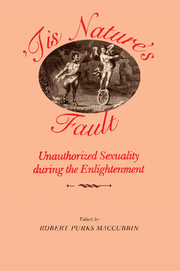Book contents
- Frontmatter
- Contents
- Introduction
- “The Secrets of Generation Display'd”: Aristotle's Master-piece in Eighteenth-Century England
- Sexual Imagination as Revealed in the Traité des superstitions of Abbé Jean-Baptiste Thiers
- Married but not Churched: Plebeian Sexual Relations and Marital Nonconformity in Eighteenth-Century Britain
- Moral Values in “La Suite de l'Entretien”
- Prostitution and Reform in Eighteenth-Century England
- The Properties of Libertinism
- Between the Licit and the Illicit: the Sexuality of the King
- The Sublimations of a Fetishist: Restif de la Bretonne (1734-1806)
- Sodomitical Subcultures, Sodomitical Roles, and the Gender Revolution of the Eighteenth Century: The Recent Historiography
- The Priest, the Philosopher, and Homosexuality in Enlightenment France
- The Pursuit of Homosexuality in the Eighteenth Century: “Utterly Confused Category” and/or Rich Repository?
- Sodomy in the Dutch Republic during the Eighteenth Century
- Parisian Homosexuals Create a Lifestyle, 1700-1750: The Police Archives
- The Censor Censured: Expurgating Memoirs of a Woman of Pleasure
- Chthonic and Pelagic Metaphorization in Eighteenth-Century English Erotica
- Modes of Discourse and the Language of Sexual Reference in Eighteenth-Century French Fiction
- The Mélange de poésies diverses (1781) and the Diffusion of Manuscript Pornography in Eighteenth-Century France
- Obscene Literature in Eighteenth-Century Italy: an Historical and Bibliographical Note
Moral Values in “La Suite de l'Entretien”
Published online by Cambridge University Press: 06 July 2010
- Frontmatter
- Contents
- Introduction
- “The Secrets of Generation Display'd”: Aristotle's Master-piece in Eighteenth-Century England
- Sexual Imagination as Revealed in the Traité des superstitions of Abbé Jean-Baptiste Thiers
- Married but not Churched: Plebeian Sexual Relations and Marital Nonconformity in Eighteenth-Century Britain
- Moral Values in “La Suite de l'Entretien”
- Prostitution and Reform in Eighteenth-Century England
- The Properties of Libertinism
- Between the Licit and the Illicit: the Sexuality of the King
- The Sublimations of a Fetishist: Restif de la Bretonne (1734-1806)
- Sodomitical Subcultures, Sodomitical Roles, and the Gender Revolution of the Eighteenth Century: The Recent Historiography
- The Priest, the Philosopher, and Homosexuality in Enlightenment France
- The Pursuit of Homosexuality in the Eighteenth Century: “Utterly Confused Category” and/or Rich Repository?
- Sodomy in the Dutch Republic during the Eighteenth Century
- Parisian Homosexuals Create a Lifestyle, 1700-1750: The Police Archives
- The Censor Censured: Expurgating Memoirs of a Woman of Pleasure
- Chthonic and Pelagic Metaphorization in Eighteenth-Century English Erotica
- Modes of Discourse and the Language of Sexual Reference in Eighteenth-Century French Fiction
- The Mélange de poésies diverses (1781) and the Diffusion of Manuscript Pornography in Eighteenth-Century France
- Obscene Literature in Eighteenth-Century Italy: an Historical and Bibliographical Note
Summary
In the Encyclopédie (1765), the anonymous author of the article, “Manstupration” [“Masturbation”] states: “Masturbation that is not habitual, not prompted by impulsive and passionate desires, and is, all things considered, motivated only by need is not in any way harmful and, therefore, in no way wrong (10:51, col. 2). This bold assertion appears again in Denis Diderot's La Suite de I'Entretien [Continuation of the Discussion] (1769) in a delightfully impudent manner: “Nature tolerates nothing useless, how then am I to blame for assisting her when called to do so by unmistakable promptings? Rather than resisting nature, should we not lend a helping hand when the need arises?”
More attentive perhaps to the similarity of theme than to the differences in style, J. Assézat and Maurice Tourneux included the article in their edition of Diderot's Oeuvres Complètes (16:97), at the cost, however, of a small but vital alteration. When annotating the same passage of La Suite, Jean Varloot wrote: “Diderot had placed in the Encyclopédie the article “Manstupration” in which the same ideas are expressed.” Varloot mistook the article's cogent manner of expression as Diderot's (“la phrase diderotienne”), whereas the article's substance is actually a faithful resumé of Samuel Tissot's treatise, L'Onanisme, ou dissertation physique sur les maladies produities par la manstupration [Onanism, or scientific dissertation on illnesses caused by masturbation] (Lausanne, 1760). Meanwhile, Jean Mayer pointed out the false assertion of Assézat-Tourneaux but mistakenly attributed the article in question to Hugues Maret, secretary of the Académie de Dijon.
- Type
- Chapter
- Information
- 'Tis Nature's FaultUnauthorized Sexuality during the Enlightenment, pp. 43 - 60Publisher: Cambridge University PressPrint publication year: 1988
- 2
- Cited by



